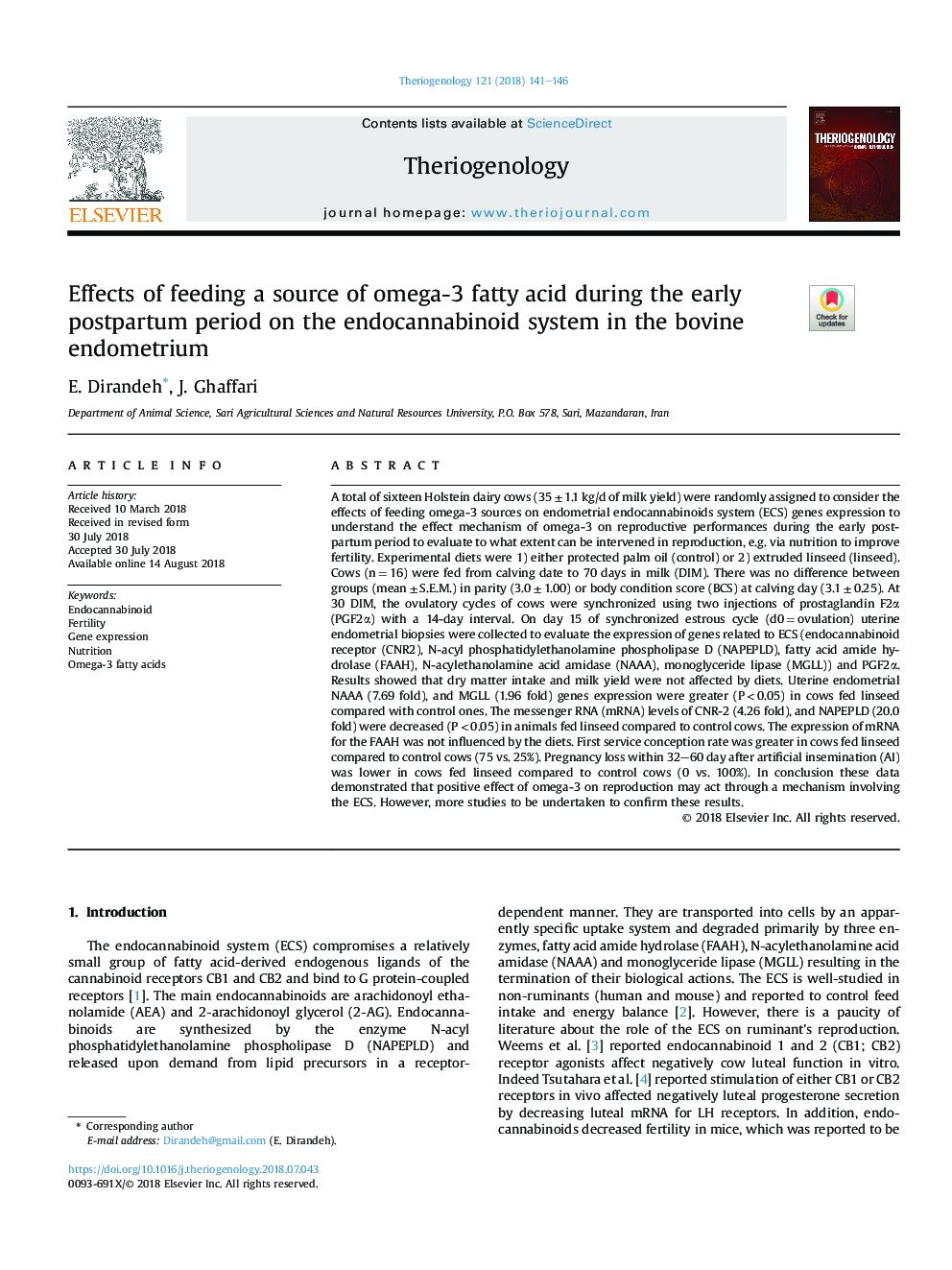| کد مقاله | کد نشریه | سال انتشار | مقاله انگلیسی | نسخه تمام متن |
|---|---|---|---|---|
| 8943838 | 1645208 | 2018 | 6 صفحه PDF | دانلود رایگان |
عنوان انگلیسی مقاله ISI
Effects of feeding a source of omega-3 fatty acid during the early postpartum period on the endocannabinoid system in the bovine endometrium
ترجمه فارسی عنوان
اثرات تغذیه منبع اسید چرب امگا 3 در دوره زود هنگام پس از زایمان بر روی سیستم اندو کانابینوئید در اندومتر گاو
دانلود مقاله + سفارش ترجمه
دانلود مقاله ISI انگلیسی
رایگان برای ایرانیان
کلمات کلیدی
آندوکانابینوئید، باروری، بیان ژن، تغذیه، اسیدهای چرب امگا 3،
موضوعات مرتبط
علوم زیستی و بیوفناوری
علوم کشاورزی و بیولوژیک
علوم دامی و جانورشناسی
چکیده انگلیسی
A total of sixteen Holstein dairy cows (35â¯Â±â¯1.1â¯kg/d of milk yield) were randomly assigned to consider the effects of feeding omega-3 sources on endometrial endocannabinoids system (ECS) genes expression to understand the effect mechanism of omega-3 on reproductive performances during the early postpartum period to evaluate to what extent can be intervened in reproduction, e.g. via nutrition to improve fertility. Experimental diets were 1) either protected palm oil (control) or 2) extruded linseed (linseed). Cows (nâ¯=â¯16) were fed from calving date to 70 days in milk (DIM). There was no difference between groups (meanâ¯Â±â¯S.E.M.) in parity (3.0â¯Â±â¯1.00) or body condition score (BCS) at calving day (3.1â¯Â±â¯0.25). At 30 DIM, the ovulatory cycles of cows were synchronized using two injections of prostaglandin F2α (PGF2α) with a 14-day interval. On day 15 of synchronized estrous cycle (d0â¯=â¯ovulation) uterine endometrial biopsies were collected to evaluate the expression of genes related to ECS (endocannabinoid receptor (CNR2), N-acyl phosphatidylethanolamine phospholipase D (NAPEPLD), fatty acid amide hydrolase (FAAH), N-acylethanolamine acid amidase (NAAA), monoglyceride lipase (MGLL)) and PGF2α. Results showed that dry matter intake and milk yield were not affected by diets. Uterine endometrial NAAA (7.69 fold), and MGLL (1.96 fold) genes expression were greater (Pâ¯<â¯0.05) in cows fed linseed compared with control ones. The messenger RNA (mRNA) levels of CNR-2 (4.26 fold), and NAPEPLD (20.0 fold) were decreased (Pâ¯<â¯0.05) in animals fed linseed compared to control cows. The expression of mRNA for the FAAH was not influenced by the diets. First service conception rate was greater in cows fed linseed compared to control cows (75 vs. 25%). Pregnancy loss within 32-60 day after artificial insemination (AI) was lower in cows fed linseed compared to control cows (0 vs. 100%). In conclusion these data demonstrated that positive effect of omega-3 on reproduction may act through a mechanism involving the ECS. However, more studies to be undertaken to confirm these results.
ناشر
Database: Elsevier - ScienceDirect (ساینس دایرکت)
Journal: Theriogenology - Volume 121, November 2018, Pages 141-146
Journal: Theriogenology - Volume 121, November 2018, Pages 141-146
نویسندگان
E. Dirandeh, J. Ghaffari,
